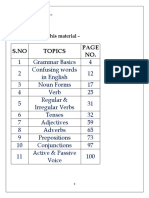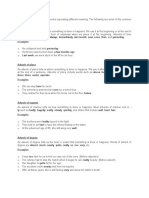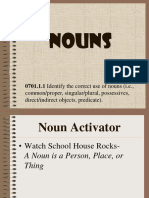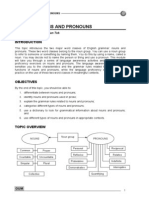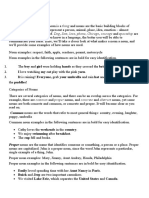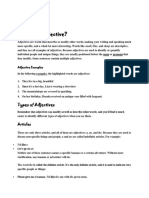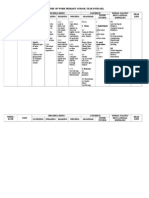Mind Your Grammar
Mind Your Grammar
Uploaded by
LizZelencichCopyright:
Available Formats
Mind Your Grammar
Mind Your Grammar
Uploaded by
LizZelencichCopyright
Available Formats
Share this document
Did you find this document useful?
Is this content inappropriate?
Copyright:
Available Formats
Mind Your Grammar
Mind Your Grammar
Uploaded by
LizZelencichCopyright:
Available Formats
Liz Zelencich
Program Manager
Capital Letters
Sentences
The rst word of every sentence begins with a
capital letter.
Millions of years ago, long before there were
any people, there were dinosaurs.
Names of people
The names of people (and pets) begin with a
capital letter.
The lost dog belonged to David.
The word "I"
Always make the word "I" a capital letter.
Alison and I walk to schools together every
day.
Place names
Place names begin with a capital letter.
Examples include the names of cities, states,
countries, planets, streets and buildings.
Essendon plays Collingwood every year on
Anzac Day at the Melbourne Cricket Ground.
Titles
The rst, last and all important words in a title
begin with a capital letter. Examples include the
titles of books, magazines, stories, poems and
movies.
The Little Mermaid, Captain Underpants, The
Australian Womens Weekly, Mulga Bills Bicycle.
Days, months and holidays
Days of the week, months of the year and
holidays all begin with a capital letter.
Easter, Christmas, July, Monday.
Join us online at: http://www.thecourier.com.au/story/2291712/newspapers-in-education/
Nouns
Common nouns
While there are many different types of
nouns, common nouns are the easiest. They
are simple words that name people, places,
things, or ideas. But they are not the actual
names of people, places or things. In other
words, the word girl is a common noun,
but the word Ashley is a proper noun
because its the specic name of that girl.
Finding examples of common nouns is
as simple as opening your eyes! Try it! What
is the rst thing you see when you wake up
each morning? Your alarm clock? The word
clock is a common noun because it names,
or identies, a thing.
What do you see when you walk out
your front door each morning? A car, a tree,
the sky, a bus, a house, a shop? All are
common nouns because they name a thing,
place, or person:
People: mother, father, baby, child,
toddler, teenager, grandmother, student,
teacher, brother, sister business person,
woman, man.
Animals: lion, tiger, mouse, dog, cat,
alligator, cricket, bird, elephant.
Things: table, truck, book, pencil, iPad,
computer, coat, shoes, chair, spoon, bowl.
Places: city, state, country, continent,
coffee shop, restaurant, park, zoo.
Proper nouns
These name specic people, places, things,
or ideas such as Britney, Melbourne,
Holden, Nike.
Since these nouns are naming specic
things, they begin with a capital letter.
Sometimes, they contain two or more
important words. Britney Spears, Melbourne
Cricket Ground, Holden Commodore, Nike
Air Pegasus.
Possessive Common
Nouns
Singular nouns
Possessive nouns show ownership or
relation to something else. To make a
singular common noun possessive, simply
add an apostrophe and the letter s.
Thebabyscrieswoketheexhausted
new parents.
Thetoddlersfacewascoveredin
birthday cake.
Thedogsbarkwasworsethanhis
bite.
Plural nouns
In order to make a plural noun possessive
that doesnt end in the letter s all you
have to do is add an apostrophe and an s.
Women=womens
Mice=mices
If the plural noun ends in an s it becomes
possessive by adding an apostrophe at the
end.
Cars=cars
Rivers=rivers
Grammar is the
system of a language. People
sometimes describe grammar as
the "rules" of a language; but in fact no
language has rules. If we use the word "rules",
we suggest that somebody created the rules rst
and then spoke the language, like a new game.
But languages did not start like that. Languages
started by people making sounds which evolved
into words, phrases and sentences. No commonly-
spoken language is xed. All languages change
over time. So think of grammar as something
good, something positive and something
that you can use to nd your way -
like a signpost or a map.
Verbs
A verb is a doing word. It shows the
action in a sentence. Think of some
things you like to do such as run, draw,
sh, play, jump. These are all verbs
because they show the action. Search
through the newspaper to nd lots of
verbs. Make a verb collage.
Can you nd the verbs in these
sentences?
Grandmadrinksteainthemorning
instead of coffee.
Thecowsandpigswererestingin
the barn.
MyfriendsandIworkedonthe
project together.
Adjectives
The simplest denition of an adjective
is that it is a word that describes or
claries a noun. Adjectives describe
nouns by giving some information about
an object's size, shape, age, colour,
origin or material. For example, a red
car, a huge tree, an old painting, a cute
dog.
Startanadjectivealphabet.Search
the newspaper to nd adjectives
beginning with each letter of the
alphabet in turn to create an 'adjective
alphabet' to help when writing stories,
descriptions etc.
Giveanadjectivebeginningwith
each letter of your name or nickname to
describe who you are or what you want
to be.
Adverbs
An adverb is a word that changes or
simplies the meaning of a verb. Adverbs
usually answer questions such as how?,
in what way? and to what extent? Often,
adverbs end in ly.
He ran quickly
They walked briskly around the lake
She spoke loudly
The bird landed lightly on the water
Gatheravarietyofpicturesfromthe
newspaper and give either a noun or verb
to them depending on what the picture
shows. Clearly a picture of a car would be
labelled car. However, the picture of a
woman sitting behind the wheel of a car
could be labelled driving.
Next, break students up into groups to
challenge each other. The purpose of the
challenge is to describe the noun pictures
using adjectives and the verb pictures
using adverbs. The opposing teams have
to gure out what is in the picture given
these clues.
Full Stops
The full stop is probably the simplest of
the punctuation marks to use. You use
it like a knife to cut the sentences to the
necessary length. Generally, you can
break up the sentences using the full
stop at the end of a logical and complete
thought that looks and sounds right to
you. Use the full stop to mark the end of
a sentence which is not a question or an
exclamation.
Rome is the capital of Italy.
I love to eat roast lamb.
I was born in Australia in 2003.
Read these sentences and correct
the capital letters and full stops.
1) i am playing in the garden
2) the man sat on the bench in the
park
3) we went to the cinema to see a lm
Mind your grammar
You might also like
- Nouns: What Is A Noun?Document10 pagesNouns: What Is A Noun?Valensia SumampouwNo ratings yet
- 01 NounsDocument65 pages01 NounsLadyjean MonteroNo ratings yet
- Parts of SpeechDocument28 pagesParts of SpeechMuhammad ImranNo ratings yet
- Grammar BasicsDocument100 pagesGrammar BasicsSairamTirumalaiGovindarajuNo ratings yet
- How To Learn English Grammar With Simple StepsDocument191 pagesHow To Learn English Grammar With Simple StepsNir Nic100% (1)
- Subject: Grammar Practice Topic-Nouns: What Is A Noun?Document3 pagesSubject: Grammar Practice Topic-Nouns: What Is A Noun?Manchia ShahriyarNo ratings yet
- Noun Definition: Examples of A Common NounDocument4 pagesNoun Definition: Examples of A Common Noun17101962No ratings yet
- Grammar Lesson - WorldenglishinstituteDocument9 pagesGrammar Lesson - WorldenglishinstituteHaron ArimaoNo ratings yet
- SulthanDocument36 pagesSulthanMuhammad firdhausNo ratings yet
- A1-pages-1Document20 pagesA1-pages-1w8jwpsrfsgNo ratings yet
- Parts of Speech in EnglishDocument8 pagesParts of Speech in EnglishEvan Maagad LutchaNo ratings yet
- Noun TypeDocument6 pagesNoun TypeLeni SusianaNo ratings yet
- Parts of SpeechDocument34 pagesParts of SpeechMariaNo ratings yet
- Part of SpeechDocument20 pagesPart of SpeechAyu Putri Aryati100% (1)
- English I: Ingeniero Jesús Paguaga Cel: 96940147Document78 pagesEnglish I: Ingeniero Jesús Paguaga Cel: 96940147Lenner Francisco González RodríguezNo ratings yet
- 8 Types of Nouns AnsweredDocument36 pages8 Types of Nouns Answeredapi-527089624No ratings yet
- Basic English Grammar RulesDocument22 pagesBasic English Grammar Rules美咲剛No ratings yet
- Subject: Grammar Practice Topic-NounsDocument3 pagesSubject: Grammar Practice Topic-NounsManchia ShahriyarNo ratings yet
- English Final EditDocument112 pagesEnglish Final EditSanathNo ratings yet
- Adverb of TimeDocument5 pagesAdverb of TimeIsha kaleNo ratings yet
- LessonsDocument4 pagesLessonsaltarmariaNo ratings yet
- Click Here For NOUNS PowerPointDocument29 pagesClick Here For NOUNS PowerPointIrish Bianca Usob LunaNo ratings yet
- Noun (Noun) : A Word (Except A Pronoun) That Identifies A PersonDocument20 pagesNoun (Noun) : A Word (Except A Pronoun) That Identifies A PersonAce ImmigrationNo ratings yet
- Communication SkillsDocument130 pagesCommunication Skillssayyed_hasan2006100% (1)
- NounsDocument4 pagesNounsValentine N100% (1)
- Language DescriptionDocument19 pagesLanguage DescriptionAtiq IshakNo ratings yet
- Nouns: Common Nouns Are The Words That Refer To Most General Things: Country, Evening, LaughterDocument5 pagesNouns: Common Nouns Are The Words That Refer To Most General Things: Country, Evening, LaughterAnna DubetsNo ratings yet
- A Narrow EscapeDocument21 pagesA Narrow EscapePrakrutiShah100% (1)
- Nouns: Noun: Definition, Rules, Examples and List of Nouns in English GrammarDocument39 pagesNouns: Noun: Definition, Rules, Examples and List of Nouns in English GrammarLogkeetha SarckunadasanNo ratings yet
- Grammar Assignment 4Document7 pagesGrammar Assignment 4shara santosNo ratings yet
- Allama Iqbal Open University Islamabad: (Department of Mass Communication)Document21 pagesAllama Iqbal Open University Islamabad: (Department of Mass Communication)jannat manoNo ratings yet
- Nouns PDFDocument36 pagesNouns PDFVeronikTancaraC100% (1)
- Mrs. Moss Name - Grammar Packet Parts of SpeechDocument29 pagesMrs. Moss Name - Grammar Packet Parts of SpeechjjmossNo ratings yet
- 8 Parts of SpeechDocument5 pages8 Parts of SpeechleijuliaNo ratings yet
- Adverbs AdjectivesDocument5 pagesAdverbs AdjectivesGunjan AgarwalNo ratings yet
- Basic English GrammarDocument78 pagesBasic English GrammarPbNo ratings yet
- NOUNS, Parts of SentenceDocument9 pagesNOUNS, Parts of SentenceMuhammad Jawad AbidNo ratings yet
- RwnotebookDocument11 pagesRwnotebookapi-31479116100% (1)
- Subject: Darrel Wrote A Novel Last Year They Rode Bicycles To SchoolDocument11 pagesSubject: Darrel Wrote A Novel Last Year They Rode Bicycles To SchoolAbhi MaheshwariNo ratings yet
- Parts of Speech Students 24-25Document7 pagesParts of Speech Students 24-25Kone DramaneNo ratings yet
- Grammar Notes Spoken English, Let's Enjoy Learning EnglishDocument21 pagesGrammar Notes Spoken English, Let's Enjoy Learning Englishwww.efrenmaria010600No ratings yet
- Review Ee ErrrrDocument15 pagesReview Ee ErrrrJessica CasipitNo ratings yet
- през6Document28 pagesпрез6dianapayzullaeva67No ratings yet
- Forms of PoetryDocument18 pagesForms of Poetryyogama100% (2)
- Week 2 - S1 - PoS - NOUNDocument15 pagesWeek 2 - S1 - PoS - NOUNTechnical InformationNo ratings yet
- Word ClassesDocument21 pagesWord ClassesBronxyNo ratings yet
- Word ClassesDocument14 pagesWord Classesnipunifernando77No ratings yet
- Microsoft Word - Session 2Document7 pagesMicrosoft Word - Session 2ngou saraNo ratings yet
- Parts of Speech - Term 3 - Notes and ActivityDocument24 pagesParts of Speech - Term 3 - Notes and ActivitySimoneNo ratings yet
- 3.1 Parts of Speech: Practise Writing Correct EnglishDocument17 pages3.1 Parts of Speech: Practise Writing Correct EnglishStricker ZexNo ratings yet
- Business CommunicationDocument203 pagesBusiness CommunicationRajeshsharmapurangNo ratings yet
- Gei002 NotesDocument10 pagesGei002 NotesAdrianne Mae Almalvez RodrigoNo ratings yet
- Types of Nouns: GeneralDocument7 pagesTypes of Nouns: Generalbarry_john06No ratings yet
- Adjectives: What Is An Adjective?Document12 pagesAdjectives: What Is An Adjective?Franziene BacsainNo ratings yet
- Grammar Basics A1Document8 pagesGrammar Basics A1SairamTirumalaiGovindarajuNo ratings yet
- The Plural of NounsDocument8 pagesThe Plural of NounsDesnaz SetiawanNo ratings yet
- Topic 1 Nouns and PronounsDocument21 pagesTopic 1 Nouns and PronounsSfm FuadNo ratings yet
- What Is An AdjectiveDocument8 pagesWhat Is An AdjectiveAnnaching Salapang100% (2)
- Abused, Confused, and Misused Words: A Writer's Guide to Usage, Spelling, Grammar, and Sentence StructureFrom EverandAbused, Confused, and Misused Words: A Writer's Guide to Usage, Spelling, Grammar, and Sentence StructureRating: 4 out of 5 stars4/5 (2)
- How We Are GovernedDocument1 pageHow We Are GovernedLizZelencichNo ratings yet
- A Walk Through TimeDocument1 pageA Walk Through TimeLizZelencichNo ratings yet
- WeatherDocument1 pageWeatherLizZelencichNo ratings yet
- Rainbow ConnectionDocument1 pageRainbow ConnectionLizZelencichNo ratings yet
- Being Well, Staying WellDocument1 pageBeing Well, Staying WellLizZelencich100% (1)
- Pablo PicassoDocument1 pagePablo PicassoLizZelencichNo ratings yet
- The Greatest Show On EarthDocument1 pageThe Greatest Show On EarthLizZelencichNo ratings yet
- Everybody Needs FriendsDocument1 pageEverybody Needs FriendsLizZelencichNo ratings yet
- A Daily Miracle Page 4Document1 pageA Daily Miracle Page 4LizZelencichNo ratings yet
- A Daily Miracle2Document1 pageA Daily Miracle2LizZelencichNo ratings yet
- A Daily Miracle Page 3Document1 pageA Daily Miracle Page 3LizZelencichNo ratings yet
- System Programming Lab Report 04Document12 pagesSystem Programming Lab Report 04Abdul RehmanNo ratings yet
- Wharton Editorial Style Guide 2017Document24 pagesWharton Editorial Style Guide 2017Diego Benavente PatiñoNo ratings yet
- The Fundamentals of Typography PDFDocument202 pagesThe Fundamentals of Typography PDFCésar NunesNo ratings yet
- Visitjapanweb Manual enDocument136 pagesVisitjapanweb Manual enNarciso de PaulaNo ratings yet
- CH 2Document21 pagesCH 2Zarnab sarfrazNo ratings yet
- Translation Style Guide SDLDocument36 pagesTranslation Style Guide SDLRoss FassbenderNo ratings yet
- Super Phonics 1 1Document20 pagesSuper Phonics 1 1michaelctwong6312No ratings yet
- Name Cards Teacher Idea PagesDocument10 pagesName Cards Teacher Idea PagesLulu NnavaeNo ratings yet
- Mind Your GrammarDocument1 pageMind Your GrammarLizZelencichNo ratings yet
- SK Lubok Kulit 27200 Kuala Lipis Pahang: Pelaporan Pentaksiran Bilik Darjah (PBD) 2019 English Language Year 1Document62 pagesSK Lubok Kulit 27200 Kuala Lipis Pahang: Pelaporan Pentaksiran Bilik Darjah (PBD) 2019 English Language Year 1rosmalinaNo ratings yet
- GeoBasic1100 Manual V130Document565 pagesGeoBasic1100 Manual V130Raul MP100% (1)
- E-AsTTle Generic RubricDocument8 pagesE-AsTTle Generic RubricMandy NelsonNo ratings yet
- CITC Writing GuidelinesDocument4 pagesCITC Writing GuidelinesomerumeromerNo ratings yet
- Guidebook 001 2010 4 B With Lecturer Note On Cover PageDocument285 pagesGuidebook 001 2010 4 B With Lecturer Note On Cover PageRobert ClarkNo ratings yet
- Vineland 3 Appendixes G HDocument34 pagesVineland 3 Appendixes G HlmontalvotreNo ratings yet
- 300+ TOP MICROSOFT WORD Multiple Choice Questions and Answers 2019Document25 pages300+ TOP MICROSOFT WORD Multiple Choice Questions and Answers 2019iqra akramNo ratings yet
- Branding Guidelines Oct 2008Document110 pagesBranding Guidelines Oct 2008Gonzalo MorenoNo ratings yet
- Scheme of Work Year 4Document27 pagesScheme of Work Year 4Devaki SubramaniamNo ratings yet
- A Hypothetical Situation:: The Language of MathematicsDocument9 pagesA Hypothetical Situation:: The Language of MathematicsYngKye YT100% (1)
- Fulbright FLTA App Instructions For CandidatesDocument6 pagesFulbright FLTA App Instructions For CandidatesAn VuNo ratings yet
- Kindergarten-Dll Week 26 (December 11-15, 2017) AsfDocument13 pagesKindergarten-Dll Week 26 (December 11-15, 2017) AsfMaria Ronavie Davalos MantesNo ratings yet
- CapitalizationDocument12 pagesCapitalizationButch VirayNo ratings yet
- Ch03 - Multimedia Element-TextDocument42 pagesCh03 - Multimedia Element-Texteriya100% (1)
- MicroStation Basic Macros...Document4 pagesMicroStation Basic Macros...Anoop SV100% (1)
- Amiral Trial 205TFDocument10 pagesAmiral Trial 205TFGemma gladeNo ratings yet
- Tutorial2 8086Document2 pagesTutorial2 8086Rajad ShakyaNo ratings yet
- Keys On The KeyboardDocument2 pagesKeys On The Keyboardawodele7No ratings yet
- (Arial, Bold, Uppercase, Size 11) : Author01@usm - My Author02@usm - MyDocument3 pages(Arial, Bold, Uppercase, Size 11) : Author01@usm - My Author02@usm - MyhazelmyaNo ratings yet
- Apa ComprehensiveDocument123 pagesApa Comprehensivemavi_panaliganNo ratings yet
- Defixiones From A Well PDFDocument55 pagesDefixiones From A Well PDFYasmin Pacheco100% (1)



